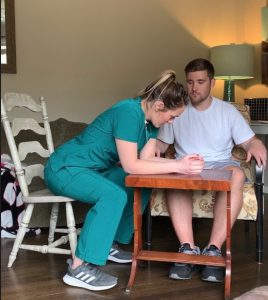When Bailey Harris started her final year of classes in January, she had no idea of the challenges she would face and overcome. Harris is studying to be an occupational therapy assistant at Arkansas Tech University-Ozark Campus, and she is on track to graduate in December 2020 with an associate degree.
In March, ATU-Ozark moved online for the remainder of the spring semester. Harris was uncertain how she would fare because many of her classes involved hands-on labs and large equipment. Being part of a great student cohort helped Harris make the switch without too much trouble.
“My cohort is amazing,” said Harris. “It has been a challenge for us as we have young children in the home with us as we are trying to study, take tests and perform skills checks by submitting videos online. Our profession that we will be entering after December is based on adapting to change. It has and will continue to better prepare us for this.”
We asked Harris to describe a typical day for students in one of her now-online classes.
“We have long days,” said Harris. “We start early, around 8, to get our schedules in order and plan out our day. We try to begin our work by 9:00 a.m., as this is when face-to-face class [previously] began daily.”
Lectures are through Blackboard Collaborate with the professors, which is the university’s software that houses the coursework, chapter presentations and labs for the day.
“Our professors worked hard for us to have access to great sources for us to further our knowledge,” continued Harris. “We are quizzed daily on the coursework covered for that day in each class. Then, we prepare and gather materials and information to complete our lab videos. Depending on the amount of material we cover in one day, we may not be done until around 4:00 or 5:00 in the afternoon.”
Harris has struggled with family responsibilities during the COVID pandemic, but she’s pushed through since she has a young daughter at home who needs her love. Acknowledging that the event is temporary, Harris understands that the situation will improve with time.
“In my book, giving up is not an option,” said Harris. “Our coursework is a great challenge, so adding a curveball was a little nerve-wracking. But I knew that each and every one of us in this cohort would be able to push through and make the best of it.”

The Occupational Therapy Assistant program involves heavy hands-on training, but through creativity, Harris and other students in her cohort are still able to have that practice while learning online.
“Our profession involves adapting and overcoming,” explained Harris. “We do a lot of training with assistive devices such as walkers, wheelchairs, dressing aids and so much more. One day, I put my two dining room chairs back-to-back and that symbolized a walker for that specific skill check video. We have had to get creative, and I think I have rearranged my house at least four times trying to gather materials to make my skills videos successful. It is quite funny if you think about it, but I made it work.”
Harris feels that this unprecedented experience of learning during COVID-19 will shape her work when she goes into the OTA field. Despite the difficulties, she feels that her cohort will have much-needed experience in creative and critical thinking, especially since they have the support of a great university.
“The Ozark Campus and ATU as a whole have been very helpful by sending out updates via email, and they continue to meet with our professors for updates,” said Harris. “The campus actually called me one day within the first two weeks of going virtual. They wanted feedback and asked if there was anything they could do to help. That made me happy because they are doing their best and gaining information from us students to see how we can, as a whole, get through this.”
Harris said her journey into the field stemmed from observation. She was able to see the unique relationship between patients and their occupational therapists when her niece was in Children’s Hospital several years ago. Harris knew then that occupational therapy was her calling. Being able to discuss her educational plans with her father before he unexpectedly passed away was a life-changing moment for Harris because she wanted to make him proud.
Family support is extremely important for Harris. “My dad inspired me tremendously,” said Harris. “My mom has an amazing work ethic, and [she] and my dad both taught me to work hard to earn the life I dream to live. My sister is the person I call when I feel down. She is full of energy and picks me up when I am down. My brother-in-law and grandparents have also been amazing supporters during my college career.”
Determined to stay positive, Harris has found a silver lining in the whole situation that she feels will help her be better in the future.
“I have always struggled with wanting an answer immediately,” concluded Harris. “Being on my computer daily for hours while having a kiddo run back and forth throughout the house has definitely taught me to have more patience. When I get in the field, this will be extremely beneficial, but it will also help me in everyday life. No one ever expects something like a world pandemic to pop up out of nowhere. The only thing we can do at this point is look at the bright side and learn from this temporary life change.”
-By Brandi Easterling Collins and Carrie Harris Phillips
for the Tech Action, Fall 2020
